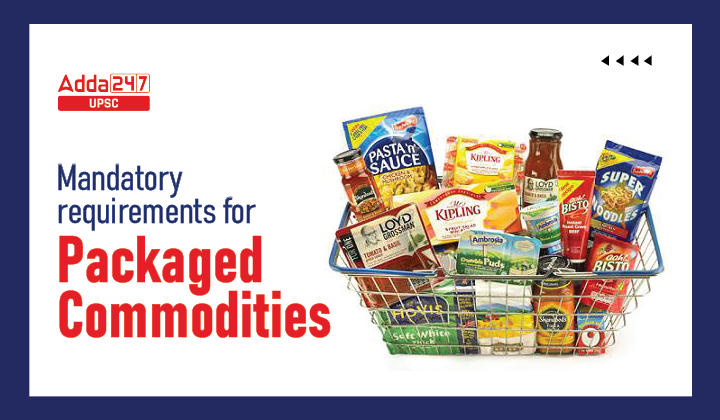Table of Contents
Mandatory requirements for Packaged Commodities- Relevance for UPSC Exam
General Studies III- Food Processing & Related Industries in India.
In News
The Department of Consumer Affairs, Legal Metrology Division has notified a draft amendment to the Legal Metrology (Packaged Commodities) Rules 2011 making some compulsions.
The mandatory provisions under the Legal Metrology (Packaged Commodities) Rules, 2011
It is mandatory under the Rules, to ensure a number of declarations, such as the:
- Name and address of the manufacturer/packer/importer.
- Country of origin.
- Common or generic name of the commodity.
- Net quantity.
- Month and year of manufacture.
- Maximum Retail Price (MRP).
- Consumer care information.
- As a consumer-oriented policy, all pre-packaged commodities should also be inspected.
- Rule 9(1)(a) provides that the declaration on the package must be legible and prominent.
- The consumers’ ‘right to be informed’ is violated when important declarations are not prominently displayed on the package.
What are the proposed amendments?
- As many blended food and cosmetic products are sold on the market, the key constituents need to be mentioned on the product packaging.
- Additionally, the front side of the package must contain the percentage of the composition of the unique selling proposition (USP).
- Also, packages displaying key constituents must display a percentage of the content used to make the product.
- The new amendments have suggested that at least two prime components should be declared on the package’s front side along with the brand name.
- Currently, manufacturers list the ingredients and nutritional information only on the back of the packaging.
- This declaration must also include the percentage/quantity of the USPs of the product in the same font size as the declaration of the USPs. However, mechanical or electrical commodities are excluded from this sub-rule.
Discrepancies over Packaged Commodities
- The Division has observed that many manufacturers/packagers/importers do not clearly label necessary declarations or prime constituents on the front of packaged commodities.
- It is common for consumers to assume that brands’ claims are accurate, but such claims are usually misleading.
- Such disclosure is deemed essential in order to protect consumer rights.
The Consumer Right
Consumer right is an insight into what rights consumer holds when it comes to the seller who provides the goods.
The consumer rights in India are listed below:
(1) Right to Safety
- Means right to be protected against the marketing of goods and services, which are hazardous to life and property.
- The purchased goods and services should not only meet their immediate needs, but also fulfil long term interests.
- Before purchasing, consumers should insist on the quality of the products as well as on the guarantee of the products and services. They should preferably purchase quality marked products such as ISI, AGMARK, etc.
(2) Right to be Informed
- Means right to be informed about the quality, quantity, potency, purity, standard and price of goods so as to protect the consumer against unfair trade practices.
- Consumer should insist on getting all the information about the product or service before making a choice or a decision.
- This will enable him to act wisely and responsibly and also enable him to desist from falling prey to high pressure selling techniques.
(3) Right to Choose
- Means right to be assured, wherever possible of access to variety of goods and services at competitive price. In case of monopolies, it means right to be assured of satisfactory quality and service at a fair price.
- It also includes right to basic goods and services. This is because unrestricted right of the minority to choose can mean a denial for the majority of its fair share.
(4) Right to be Heard
- Means that consumer’s interests will receive due consideration at appropriate forums. It also includes right to be represented in various forums formed to consider the consumer’s welfare.
(5) Right to Seek redressal
- Means right to seek redressal against unfair trade practices or unscrupulous exploitation of consumers. It also includes right to fair settlement of the genuine grievances of the consumer.
- Consumers must make complaint for their genuine grievances. Many a times their complaint may be of small value but its impact on the society as a whole may be very large.
(6) Right to Consumer Education
- Means the right to acquire the knowledge and skill to be an informed consumer throughout life.
- Ignorance of consumers, particularly of rural consumers, is mainly responsible for their exploitation.




 TSPSC Group 1 Question Paper 2024, Downl...
TSPSC Group 1 Question Paper 2024, Downl...
 TSPSC Group 1 Answer key 2024 Out, Downl...
TSPSC Group 1 Answer key 2024 Out, Downl...
 UPSC Prelims 2024 Question Paper, Downlo...
UPSC Prelims 2024 Question Paper, Downlo...




